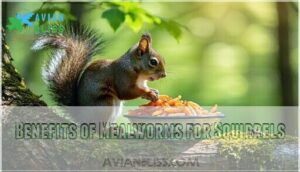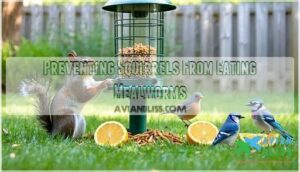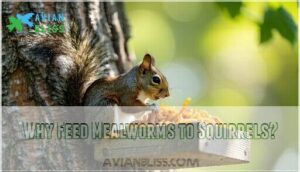This site is supported by our readers. We may earn a commission, at no cost to you, if you purchase through links.
 Yes, squirrels eat mealworms, and it’s not just because they’re curious nibblers! Mealworms are packed with protein and nutrients, making them a great energy boost for these active little creatures.
Yes, squirrels eat mealworms, and it’s not just because they’re curious nibblers! Mealworms are packed with protein and nutrients, making them a great energy boost for these active little creatures.
Whether the mealworms are live or dried, squirrels find them hard to resist—almost like we might eye a protein bar after a workout.
In the wild, they’ll grab what they can, so offering mealworms can be a fun way to treat your backyard visitors. Think of it as adding a little variety to their usual diet of nuts and seeds.
Curious how to feed them safely? Let’s unpack that next!
Table Of Contents
Key Takeaways
- Squirrels eat mealworms because they’re packed with protein and nutrients, giving them an energy boost for their active lifestyles.
- You can offer live or dried mealworms, but keep portions small to balance their diet with natural foods.
- Mealworms make a great occasional snack, aiding muscle strength, immune support, and overall health.
- If you want to keep squirrels away from mealworms meant for birds, use squirrel-proof feeders or sprinkle chili powder as a natural deterrent.
What Are Mealworms?
Mealworms are the larvae of the Tenebrio molitor beetle, commonly found in gardens, forests, and even compost piles.
Packed with protein and nutrients, these tiny critters are a natural snack that many animals, including squirrels, can’t resist.
Mealworms as a Food Source for Squirrels
Mealworms pack a punch for squirrel nutrition, acting like a mini protein bar for these furry foragers.
Mealworms are nature’s protein bars, fueling squirrels with energy and nutrition for their acrobatic leaps and curious adventures.
Squirrels find them irresistible, thanks to their taste and high protein content.
Here’s why mealworms make a great addition to a squirrel food list:
- High-protein snack to boost energy.
- Easy to forage in urban availability areas.
- Supports diverse diets for ideal health.
- Occasional treat to complement natural squirrel preferences.
Offer sparingly for a balanced squirrel diet!
Mealworms as a High-Protein Food
Looking for a powerhouse protein source for your furry backyard visitors? mealworms are a fantastic choice! Packed with protein, amino acids, and healthy fats, they’re an energy boost squirrels can’t resist.
These insects are like tiny superfoods—nutritious, tasty, and easy to munch on.
Mealworm nutrition highlights include:
- Protein-packed: Up to 20% protein content to fuel strength and activity.
- Amino acids: Essential for muscle recovery and growth in a squirrel diet.
- Vitamins and minerals: Like B-complex, zinc, and iron for overall health.
- Healthy fats: Provide lasting energy during busy foraging days.
Your squirrels will thank you for this tasty treat!
Mealworms as a Natural Food Source
Squirrels know how to spot a good snack, and mealworms are no exception.
These wiggly insects are part of a wild squirrel’s diet, offering a protein-packed boost straight from nature.
Thanks to their natural foraging behavior, squirrels often stumble across Wild Mealworm Habitats like leaf litter, compost piles, and rotting wood.
Mealworms are busy little creatures cycling through fascinating life stages:
Because of their Seasonal Availability and high mealworm nutrition, they’re a reliable protein source in the wild, aiding ecosystem integration and influencing what squirrels eat.
For wild squirrels, finding these treats is like striking protein gold!
Do Squirrels Eat Mealworms?

Yes, squirrels eat mealworms, and they seem to enjoy this protein-packed snack.
Whether live or dried, mealworms provide a quick and nutritious energy boost, especially when other food sources are scarce.
Squirrels Eating Live Mealworms
Live mealworms are like a gourmet hunt for squirrels, spicing up their natural foraging instincts.
Watching their excitement as they chase these wriggly snacks is pure wildlife entertainment! Hunting live mealworms offers not just fun but also a healthy boost to their diet.
- Adds excitement: Encourages natural squirrel hunting behavior.
- High nutritional value: Provides protein and essential nutrients.
- Freshness matters: Live mealworm freshness is key for maximum perks.
- Escape risks: Verify mealworms stay contained before feeding.
- Supports their instincts: Mimics natural foraging in the wild.
Feeding squirrels live mealworms creates a thrilling backyard safari!
Squirrels Eating Dried Mealworms
In the context of feeding squirrels, dried mealworms are a hit!
They’re easy to store and long-lasting, making them cost-effective for regular squirrel snacks.
The drying benefits mean no wiggling, just crunchy bites packed with protein for squirrels.
Mixing dried mealworms with safflower seeds attracts squirrels while balancing their diet.
Adjust feeding frequency to suit their appetite, and enjoy watching their happy, jittery antics as they munch this nutritious treat!
Squirrels Eating Mealworm Suet
Packed with protein and energy, mealworm suet is a squirrel favorite, especially during colder months when calories are vital.
This high-fat treat blends the Suet Nutritional Value of insects and fats into a must-have for your backyard visitors. Ensuring feeder visibility matters for attracting a variety of animals.
Here’s how to make mealworm suet feeding a success:
- Use sturdy suet feeders positioned high to challenge their acrobatic skills.
- Experiment with Suet Recipe Ideas, like mixing dried mealworms with fat, nuts, or seeds.
- Observe Feeding Frequency—offering suet a few times weekly ensures balance.
- Adjust for Seasonal Consumption, particularly in fall and winter when squirrels need extra calories.
This approach supports their health while keeping feeding fun and rewarding!
Benefits of Mealworms for Squirrels
Mealworms pack a punch in terms of nutrition, giving squirrels a solid source of protein, healthy fats, and essential vitamins.
They’re especially helpful during times of growth or when squirrels need extra energy to stay active and healthy.
Nutritional Benefits of Mealworms
Mealworms are like a power-packed snack bar for squirrels, offering a perfect mix of nutrition and energy.
Mealworms are tiny energy boosters, packed with protein and nutrients, fueling squirrels for their acrobatic adventures and busy foraging days.
As a rich protein source, they help squirrels maintain muscle strength and endurance. The vitamin content, including B vitamins, promotes healthy development and boosts immunity.
The mineral richness, with zinc and magnesium, supports strong bones and overall health. Add in some healthy fats, and you’ve got an ideal energy boost for those acrobatic leaps and bounds.
Though low in fiber, mealworms round out a squirrel’s diet with plenty of benefits, making them a highly nutritious treat worth gathering or sharing!
Mealworms as a Source of Protein and Vitamins
Mealworms are like bite-sized nutritional gold for squirrels! They’re loaded with protein, helping squirrels build strength and stay active.
Plus, their vitamin-packed goodness includes B6 and B12 for an energy boost and vitamin D for sturdy bones. Mealworm benefits don’t stop there—they also provide essential minerals to support overall squirrel health.
Think of them as nature’s perfect dietary supplement!
- Protein content: Builds muscle.
- Vitamin sources: Energy and bone health.
- Mineral benefits: Overall wellness.
- Squirrel health: Essential support.
Mealworms Supporting Healthy Growth and Development
Squirrels may be small, but their bodies demand big nutrition, especially when growing.
Mealworms pack a punch, offering essential protein for muscle growth, bone development, and even immune support. These high-protein snacks act like miniature fuel pellets, keeping squirrels healthy and energetic.
Here’s a quick look at mealworm benefits: Many birds also benefit from mealworms, especially during winter months.
| Nutrient | Benefit | Impact |
|---|---|---|
| Protein | Muscle Growth | Builds strength |
| Vitamin B Complex | Cognitive Function | Supports quick thinking |
| Healthy Fats | Immune Support | Boosts overall resilience |
Adding mealworms to their diet is like giving squirrels a nature-approved health boost!
Where Do Wild Mealworms Live?
You’ll find wild mealworms living in leaf litter, rotting wood, and other damp, sheltered spots.
They thrive in areas like compost piles, gardens, and even near riversides where moisture keeps their food sources plentiful.
Mealworms in Leaf Litter and Rotting Wood
The forest floor thrives as a bustling hub of decomposition ecology, where mealworms from leaf litter and rotting wood play their part.
These protein-packed insects thrive in damp niches like decayed logs, benefiting from wood decay while growing through their larval development phase.
For squirrels, this natural habitat of insects becomes a convenient cafeteria. Hungry critters uncover these hidden treasures, combining their resourcefulness with nature’s processes to snack on mealworms nestled in their earthy hideaways.
Mealworms in Compost Piles and Gardens
In your compost pile, mealworms thrive on decaying organic material, turning scraps into rich soil fertilizer.
These darkling beetle larvae contribute to a healthy compost ecosystem but also attract squirrels seeking a protein boost.
Their presence in gardens isn’t all bad—they’re natural pest controllers and aid soil enrichment.
- Key roles of mealworms in compost piles:
- Break down organic matter quickly.
- Support nutrient-rich soil environments.
- Attract wildlife like squirrels, adding biodiversity.
Mealworms Near Riversides and Moist Areas
Riversides are a hub for Riverside Mealworms, benefiting from their Moisture Preference and unique habitat.
Near water, mealworms thrive in damp, shady soil, creating an ideal spot for growth. The constant activity around rivers leads to nutrient-packed environments and reliable food sources.
Here’s why these areas attract mealworms:
- Humidity: Flowing water keeps the ground perfectly moist.
- Habitat Influence: Dense plants provide natural protection.
- Dietary Adaptations: Decaying leaves serve as a continuous feast.
- Insects abound: Other bugs enhance their omnivorous dining.
- Urban Proximity: Even squirrels venture nearby for this protein-packed snack!
How to Feed Mealworms to Squirrels
Feeding mealworms to squirrels is easy and can be a fun way to support their nutritional needs.
Whether you choose live, dried, or suet-packed mealworms, you’ll quickly see why squirrels enjoy this protein-rich snack.
Feeding Live Mealworms to Squirrels
Live mealworms are a protein-packed treat squirrels might love.
For safe feeding, use tweezers to handle mealworms, ensuring cleanliness and easy offering. Start with small, young mealworms—they’re easier for squirrels to munch on.
Want to make it fun? Try scattering mealworms on the ground for a natural foraging experience or placing them on a platform feeder for close observation.
Hungry squirrels often dive right in, but don’t worry if others seem picky—they might just be full! Purchase live mealworms online for convenience. Squirrels can sometimes be deterred with squirrel-resistant feeders.
Feeding Dried Mealworms to Squirrels
Dried mealworms are a convenient and protein-rich way to treat your squirrel visitors. They’re easy to store, less messy than live ones, and squirrels love them!
A few simple steps can guarantee safe feeding practices and happy squirrels:
- Opt for high-quality dried mealworms to provide the best nutrition.
- Keep them fresh by storing in airtight containers, away from dampness.
- Soak mealworms in water first if your squirrels prefer softer snacks.
- Start with small portions—squirrels can enjoy variety, but moderation’s key.
Mixing mealworms with nuts or seeds creates an irresistible blend for your furry neighbors!
You can even find various squirrel products online.
Feeding Mealworm Suet to Squirrels
Mealworm suet is a fantastic way to satisfy squirrels with a high-protein snack.
It’s easy to find pre-made suet cakes online, or try your hand at homemade suet—perfect for adding variety to their diet.
Seasonal suet variations let you switch things up, keeping backyard visitors interested. Consider buying suet online for convenience and variety.
Always prioritize suet feeding safety by storing mealworm suet properly in cool, dry spaces. Follow these squirrel feeding tips to offer a nutritious treat squirrels will love during scarce seasons!
Preventing Squirrels From Eating Mealworms
If you’re looking to stop squirrels from munching on mealworms meant for other wildlife, a few simple strategies can help.
By making feeders less squirrel-friendly and using natural deterrents, you can protect your mealworms without much hassle, which is a key aspect of maintaining a squirrel-free feeding area.
Using Squirrel-Proof Feeders
Want to save your mealworms for birds? Squirrel-proof feeders are your best bet! They use clever baffle designs and feeder mechanisms to outsmart squirrels.
Pair them with smooth poles at least five feet tall and place them ten feet from any launch points. For added protection, choose sturdy feeders with small openings that birds can access but squirrels can’t.
Many options exist for effective squirrel prevention.
Here are some squirrel feeding tips:
- Use tall, smooth poles squirrels can’t climb.
- Add dome-shaped baffles to block access.
- Invest in metal feeders with tough designs.
- Opt for weight-sensitive mechanisms.
- Consider DIY feeders for cost-effective solutions.
Using Chili or Cayenne Pepper to Deter Squirrels
Spice things up to keep squirrels tolerant of boundaries.
Capsaicin in hot peppers doesn’t bother birds but sends squirrels packing.
For effective pepper application, try these:
- Sprinkle chili powder or flakes over mealworms.
- Mix hot peppers with water for a DIY spray.
- Dust mealworms lightly with cayenne pepper.
- Blend paprika with other spices for variety.
- Experiment with different pepper effectiveness for long-term impact.
Alternative deterrents guarantee mealworms stay bird-friendly! Using hot peppers can be an effective method to keep squirrels away.
Moving Bird Feeders Out of Reach
Strategic pole placement and feeder location can outwit even the most determined squirrels.
Follow the 5-7-9 rule: place feeders 5 feet high, 7 feet from jumping distance, and 9 feet below branches. Add baffles with proper baffle height for extra defense.
Trim nearby branches to limit squirrel access.
| Location | Squirrel Risk | Bird Safety |
|---|---|---|
| Open Pole | Low | High |
| Near Deck | Moderate | Medium |
| Branch End | High | Low |
| Metal Post | Minimal | High |
| Fence Top | Very High | Poor |
Why Feed Mealworms to Squirrels?
Feeding mealworms to squirrels gives them a protein-packed snack that supports their energy needs and overall health.
It’s a simple way to attract these curious creatures to your yard while helping them thrive, especially during demanding times like growth or raising young, which is crucial for their overall health.
Encouraging Squirrels to Visit Your Backyard
Creating a backyard habitat for squirrels is easy and rewarding.
Install elevated feeders stocked with safe treats like mealworms, and don’t forget water sources and cozy shelter options nearby.
Incorporate natural foods like nuts and seeds alongside squirrel-friendly plants.
To further enhance your backyard’s appeal, consider planting nut-bearing trees.
By meeting their needs, you’ll observe fascinating squirrel behavior as these curious creatures make your space their favorite spot for snacking and exploring.
Providing a Nutritious and Enjoyable Treat
Mealworms are a fantastic treat for squirrels, offering protein and nutrients they crave.
With simple mealworm preparation, you can provide live or dried options that suit squirrel preferences.
Are mealworms safe? Absolutely, if given in safe quantities.
Use mealworms as occasional snacks alongside their natural diet. Rotating treat alternatives like seeds keeps feeding methods fun and balanced.
Watching squirrels enjoy mealworms isn’t just rewarding—it’s an entertaining backyard experience!
Supporting Healthy Growth and Development in Squirrels
Mealworms can give squirrels a tremendous boost in nutrition, acting like tiny protein-packed power bars.
Packed with protein, vitamins, and minerals, they’re fantastic for supporting squirrel health, especially during growth, breeding, or cold seasons.
Think of mealworms as a natural vitamin supplement, improving muscle strength, fur quality, and immune resilience.
Adding mealworms to their diet promotes better hydration absorption and overall development, turning your backyard into a haven for lively, healthy squirrels with improved muscle strength and immune resilience.
Frequently Asked Questions (FAQs)
Are mealworms good for squirrels?
You are what you eat," and mealworms are a nutritious treat for squirrels.
Packed with protein, healthy fats, and vitamins, they’re especially beneficial during breeding or growth periods, boosting energy and supporting their overall health.
Do squirrels eat insects?
Squirrels do eat insects, especially when they need extra protein or energy.
They’re opportunistic feeders, so bugs like mealworms, ants, and grubs can make a tasty treat, particularly during breeding or when food is scarce.
Do squirrels eat worms?
When squirrels dabble in insect cuisine, worms might make a cameo, though it’s not their main staple.
As opportunistic eaters, they’ll occasionally snack on worms if the protein boost fits their seasonal needs.
What animals eat mealworms?
Plenty of creatures enjoy mealworms, from birds like robins and blue jays to reptiles, amphibians, and small mammals like hedgehogs.
Even some fish munch on them, proving mealworms are quite the versatile snack option!
Can squirrels eat chili?
Chili is safe for squirrels to eat, but they typically avoid it.
Capsaicin, the spicy compound in chili, doesn’t harm squirrels but deters them, making chili a clever trick to keep your bird feeders squirrel-free!
Can you eat squirrels?
About 150,000 people in the U.S. hunt squirrels for food annually.
You can eat them, as their meat is lean and protein-packed.
Just cook it thoroughly, remove gamey flavors, and enjoy safely.
What animal eats mealworm?
Mealworms are a tasty snack for many animals, including birds, reptiles, amphibians, and rodents like mice.
They’re packed with protein, making them a favorite for creatures needing an energy boost or growing strong.
What should you not feed squirrels?
Avoid feeding squirrels processed foods, salty snacks, or sugary treats—they’re terrible for their health.
Skip dairy, bread, and raw peanuts too, as these can cause digestive issues or negatively impact their nutritional balance.
Which animals eat mealworms?
Lots of animals munch on mealworms, including birds, reptiles, amphibians, fish, and small mammals like mice, hedgehogs, and squirrels.
They’re packed with protein, making them a favorite snack for creatures needing a quick nutritional boost!
Do grey squirrels eat worms?
Grey squirrels occasionally eat worms, especially when food is scarce or they need extra protein.
They’re not picky eaters, so if worms happen to cross their path, they may snack on them.
Conclusion
Turns out, squirrels aren’t just nut enthusiasts—they’re mealworm fans too!
Whether you’re tossing them live mealworms, dried ones, or even mealworm suet, these high-protein snacks pack a punch for their active lifestyles.
If you’re aiming to attract squirrels to your yard, offering mealworms is a fun, nutritious option they’ll love.
But if you’d rather keep your feeders safe, consider deterrents.
Either way, answering “do squirrels eat mealworms” is simple—they sure do, and they’re not picky about high-protein snacks, and they love mealworm suet.








